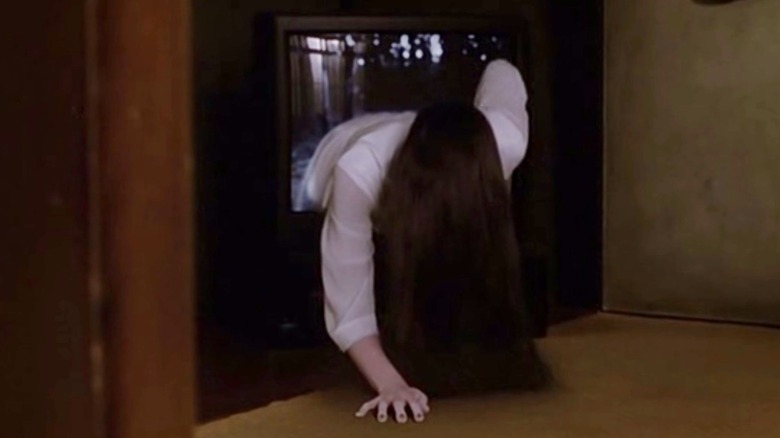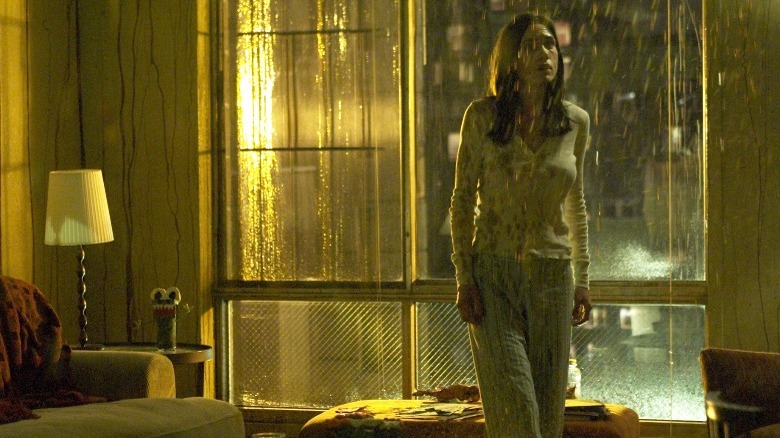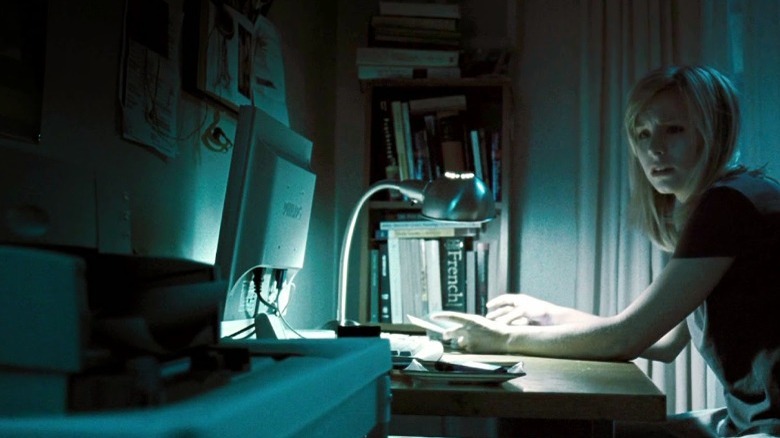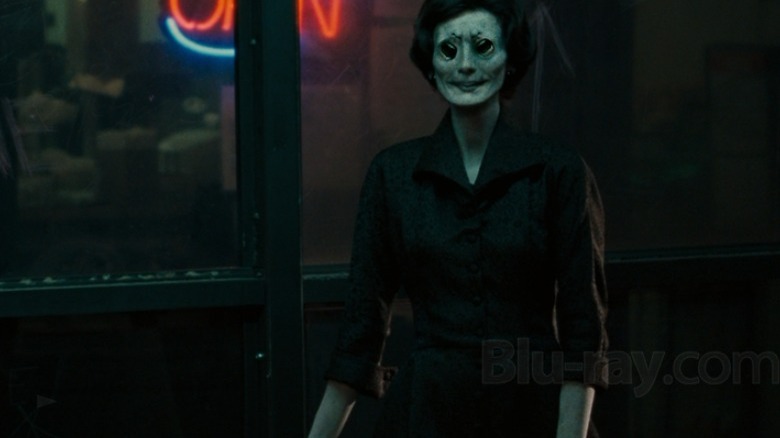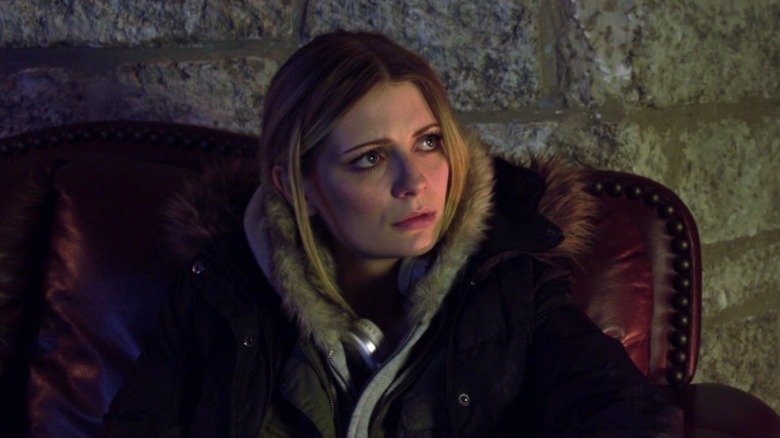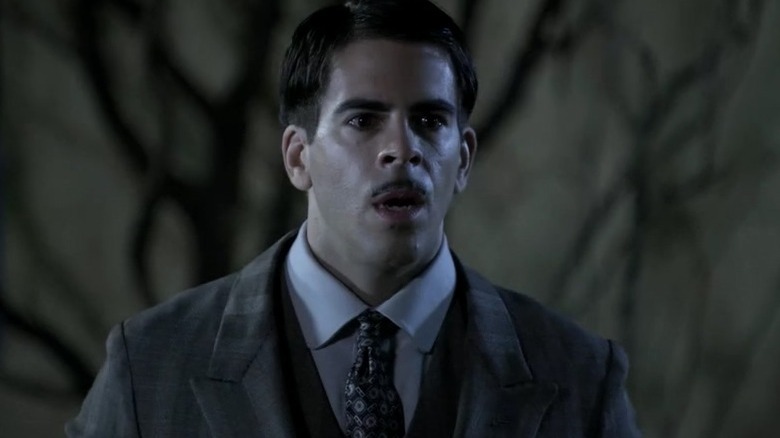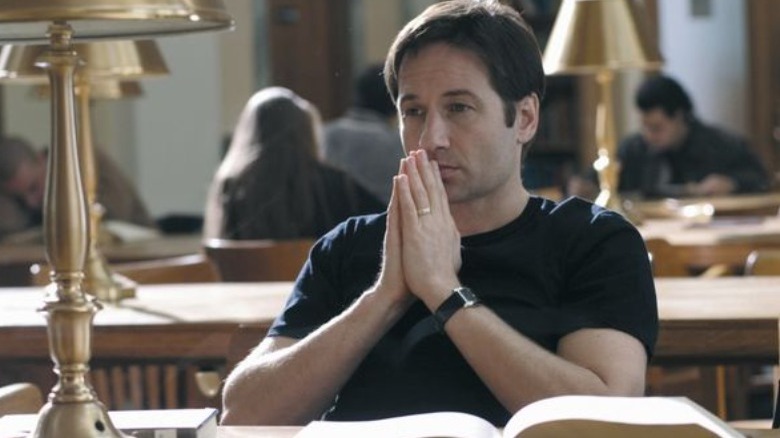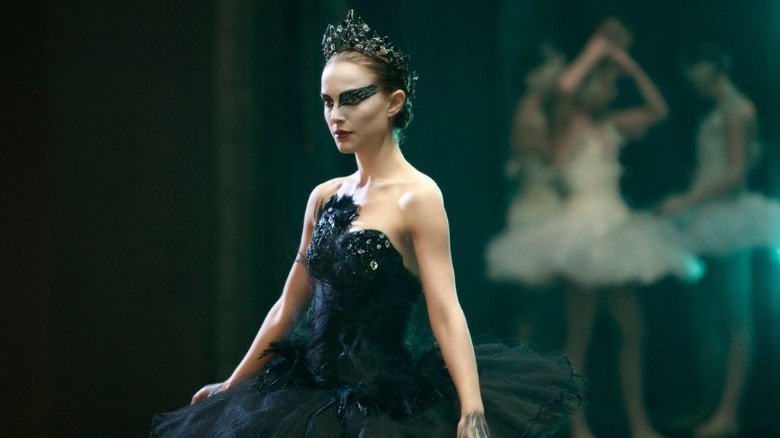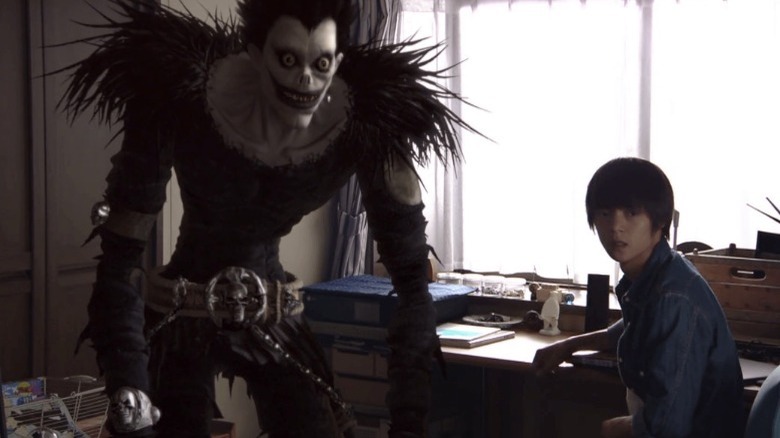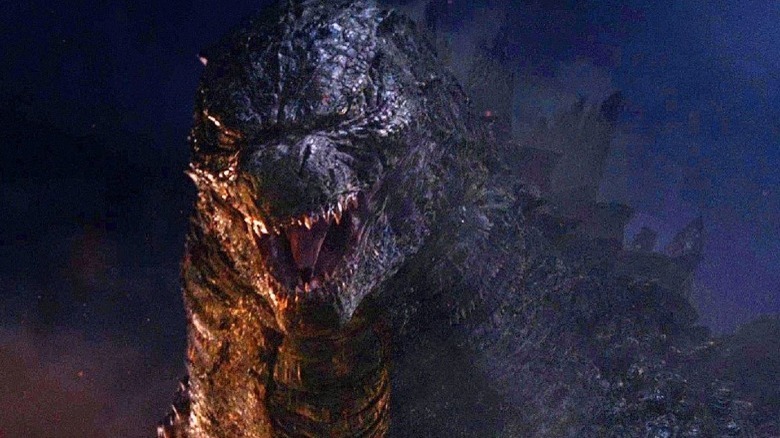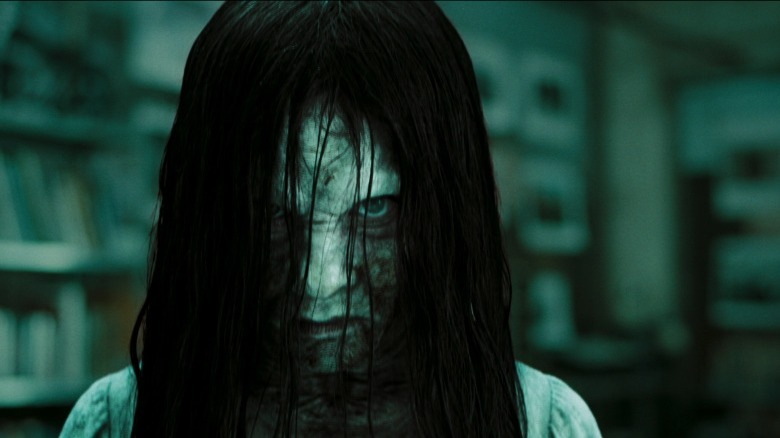10 American Horror Movies You Didn't Realize Were Adapted From Japan
It may seem like a distant memory now, but there was a time when Japanese horror, colloquially known as "J-horror", dominated the horror landscape. If there wasn't a black-haired ghost girl with a pale face popping up from out of frame, it likely wasn't getting released. The early aughts saw an enormous influx of Asian horror remakes, with titles from Japan, South Korea, Thailand, and beyond getting the good old-fashioned American treatment. Often, the results were lackluster, with some outlets such as FilmDaily describing the remake machine as "murder" with regard to the originals.
Indeed, Asian horror, though especially Japanese horror, was imbued with so many distinct cultural touchstones and nuances, translation was inexorably difficult. Still, among the quick jolts and haunted faces, there was still stuff worth seeing. Here, we'll be looking at 10 American horror movies you may not have realized were adapted from Japan. These range from higher-profile genre outputs to smaller indie releases, though all of them, in one way or another, were adapted from Japanese originals.
Dark Water
The original Japanese "Dark Water" is one of the dourest, oppressive ghost stories ever made. Hideo Nakata's urban ghost story follows Yoshimi Matsubara (Hitomi Kuroki), a woman in the midst of a custody dispute over her young daughter, Ikuko (Rio Kanno). Consigned to a derelict apartment building with a perennial leak, Yoshimi soon discovers a supernatural presence in the building, most prominently the appearance of a young girl. 2005's "Dark Water" is an American remake that, for the most part, keeps the plot the same. Oscar-winner Jennifer Connelly lends her considerable talents as the mother, with Ariel Gade taking on the role of Cecelia, the young daughter.
What's most curious is that, at a time where horror was starting to shift toward more extreme output ("Dark Water" released the same year "Wolf Creek" did), "Dark Water" scaled things back. Even compared to the original, "Dark Water" is less concerned with scaring its audience than distressing them. While the supernatural goings-on remain, they're less prominent, with remake director Walter Salles more interested in exploring Connelly's young mother and the oppressive nature of unemployment and tenuous custody. It remains just as dour, though it is the rare remake that endeavored to do its own thing.
Pulse
Where "Dark Water" endeavored to do its own thing to its credit, "Pulse" borrowed elements from Kiyoshi Kurosawa's Japanese classic cyber-thriller to its detriment. Where Kurosawa's original featured one of the century's scariest conceits – loneliness in the digital age is like a ghost — Jim Sonzero's remake, confoundingly written by genre maestro Wes Craven, bludgeons nuance to death. The general framework remains the same (ghosts from the internet spill over into the real world) and there are several shot-for-shot replications, but the tempered approach is eschewed in favor of conventional American thrills.
Expect plenty of jumps, jolts, and digital ghosts, rendered in "Scooby-Doo" effects and fuzzy, blue things like television static — a far cry from Kurosawa's realistically realized apparitions. The general mood is so different, in fact, that general audiences wouldn't be remiss for missing the connection to one of this century's scariest J-horror outings. The American remake had it all but a pulse of its own.
One Missed Call
"One Missed Call" is not a good movie. It's not even so-bad-it's-good. "One Missed Call" is simply bad. Parallel with "Pulse," it's similarly adapted from an early-aughts J-horror classic, one whose resonance and impact extends far beyond its year of release. Takashi Miike of "Audition" fame delivered a cruel, grisly piece of millennium cyber horror here, high-concept stuff delivered with all of Miike's subversive technical flourishes and cinematic depravity, and the climactic televised exorcism all but cements its classic status.
Eric Valette's remake came five years after the original, right at the tail end of the J-horror craze. It missed both the critical and commercial success of a dying subgenre ("One Missed Call" grossed a meager $45 million against a $20 million budget) and condensed the original in the worst way. Like "Pulse," lovingly crafted specters are rendered as little more than CG-ghosties that could belong to any horror property. There's no identity of its own, and even a committed Shannyn Sossamon isn't enough to save it. Still, it remains a curious Hollywood case study in Japanese remakes, even if it is a call ultimately worth missing.
Apartment 1303
"Apartment 1303" is likely (definitely) less remembered than the aforementioned entries. An almost unknown remake of an almost unknown Japanese original, it stars a post-"The OC" Mischa Barton and Julianne Michelle as sisters, the latter of whom moves to a new apartment that, naturally, is haunted. When Michelle's Janet ostensibly kills herself, Barton's Lara goes to investigate and uncovers a series of mysterious suicides in the building. Soon, the same vengeful spirit is targeting her.
It's a lackluster, semi-exploitative shocker, one that defies common sense frequently and whose narrative developments further confound. The original Japanese movie wasn't particularly well-received, and were it not adapted from "Ju-on" author Kei Oishi's original novel, it likely never would have seen a green light at all. It's not terrible, strictly speaking; it just kind of exists. It has all of the conventional haunted house tropes, though — like the previous entries on this list — similarly sacrifices what little behavioral nuance the original had for flatter, louder scares. In other words, it's not an apartment worth renting.
Don't Look Up
Before "Ringu," Hideo Nakata terrified the world with "Don't Look Up" (There's a solid argument to be made that this list be retitled "American Horror Movies You Didn't Realize Were Adapted from Hideo Nakata," though I digress). In "Don't Look Up," a young director (Yūrei Yanagi) shooting a war film discovers strange footage involving a pale woman with long black hair — a trope was born.
Hideo Nakata's own "Ghost Theater" was promoted as a remake of "Don't Look Up," though that isn't actually the case. In fact, Hollywood and Hong Kong producer/director Fruit Chan had produced a remake of their own. Rachael Murphy, Eli Roth, and Ben DiGregorio star in the basest of remakes. As is common at this point, the general conceit has been Xeroxed to death. Here, evil spirits trapped in old celluloid film cause a film crew to go insane, though similarities are nonexistent beyond that. Like "One Missed Call," it arrived too little, too late. It's a shallow, loud, artistically anemic remake, one that yields none of Nakata's artistry or penchant for the macabre.
The Secret
"Secret," titled "Himitsu" in Japan, isn't exactly a horror movie. Yôjirô Takita's film is a fantastical drama with horror shadings, not unlike 2017's criminally underrated "The Keeping Hours." Never scary, the supernatural elements are enough to elevate it to a genre-adjacent place. In it, a man discovers that his wife's mind has been transferred to their daughter's body after the two of them are involved in a deadly car crash where only their daughter survived. It's not exactly heartwarming material — it's hard to move past the central conceit — though it's bold enough to work at times.
The English-language remake amps up the horror elements while removing any trace of what made Takita's film unique. It stars David Duchovny and is directed by Vincent Perez, a director with only three credits to his name, if that's indicative of anything (it is). It's a movie destined to be forgotten, so thoroughly removed from its source material that it feels like an entirely different movie, one that poses the question — why remake it in the first place? This one should remain a secret no one knows.
Black Swan
"Black Swan's" inclusion here might register to some as cheating, though just because something is said often enough, it doesn't make it true. Basically, "Black Swan" director Darren Aronofsky has repeatedly denied that his Oscar-nominated hit is in any way, shape, or form a remake of Satoshi Kon's "Perfect Blue." "Perfect Blue" follows a retired musician, Mima Kirigoe, who loses her grip on reality after she is enveloped in a series of stalk-and-slash murders. "Black Swan" is the story of a ballet dancer who loses her grip on reality after vying for the lead in her company's production of Tchaikovsky's Swan Lake. Both feature female artists caught in a tailspin, with hazy hallucinations, tenuous conceptions of reality, and austere horror elements. Aronofsky additionally owns the American rights to "Perfect Blue." Do with that what you will.
Whether Aronofsky intended for it to be or not, "Black Swan" is nonetheless a stellar companion to Kon's "Perfect Blue." Where "Perfect Blue" is animated, "Black Swan" is live-action, though both detail two stunningly crafted and culturally distinct portraits of artists on the decline. Fame and talent corrupt and horrify, and if nothing else, it's thrilling to see two modern auteurs tackle similar material.
Death Note
"Death Note" attracted a lot of controversy before it was even released. Indeed, Adam Wingard's adaptation of the famous Japanese manga of the same name seemed poised to fail from the start. In it, a young man finds himself in possession of the "Death Note," a supernatural notebook that kills anyone whose name is written in it. Wingard's take on the material was described as "thoughtless" and "lazy," a whitewashed adaptation that — get ready for this — replaced every and all distinct cultural touchstone for conventionally American iconography and staging. In other words, "Cowboy Bebop" isn't Netflix's first rodeo with live-action anime flops.
For less discerning viewers, it would be easy to bundle "Death Note" in with dozens of other weekly Netflix releases, the kind of movies developed to be seen, forgotten, and never returned to. In effect, not the kind of movie to inspire a deep dive into the original. "Death Note" at least has the decency to feature some of Wingard's signature style and frenetic filmmaking. Additionally, the deaths are suitably grim, and while it's no substitute for the manga, it has plenty of style to spare. It's one of the stronger remakes of Japanese source material, even if the bar itself isn't particularly hard to clear.
Godzilla (2014)
At its core, Ishirō Honda and Toho's "Godzilla" franchise has always belonged to the horror genre. The tale of a giant Kaiju terrorizing Japan and triggering fears of nuclear destruction in the post-war era created an enduring cinematic icon in Godzilla (Gojira). It is the longest-running film franchise according to Guinness, with several American remakes and crossovers through Legendary pictures continuing to dominate the box office. There is a chance, however, that as the crossovers increase (Godzilla has taken on Kong, who's next?), the connection to the original Japanese franchise will grow more tenuous.
That is most evident in the rebooted Monsterverse's first entry, Gareth Edwards' aptly titled "Godzilla," which arrived in 2014. A radically different beast — or kaiju — than the films that came before, Edwards' remake departed from the franchise formula, conceiving a distinctly American story with humans, not giant lizards, at its center; Godzilla himself only appears in about eight total minutes of footage. Horror bleeds through the periphery, especially during a claustrophobically shot aerial descent into a war-torn San Francisco, and among the current crop of remakes, it's the title that feels most like its own thing. While the franchise grew bigger and bolder as it went on, it's easy to forget that Edwards' Godzilla is modeled after Japan's own little kaiju that could.
The Ring
Gore Verbinski's "The Ring" is the movie that ignited the J-horror craze. A videotape, a phone call, and seven days of agony were all it took for Verbinski's remake of Hideo Nakata's "Ringu" to become a sensation, a techno-horror-thriller that took in an unprecedented $250 million when it opened in October of 2002. It featured some of the scariest scenes this side of "The Exorcist," and has an ending that's shocked and awed audiences for years.
The most obvious American remake of a Japanese classic (both of which inspired series of their own), it's likely there are still audiences that miss the Japanese connection, especially as the movie approaches its two-decade anniversary. Newer audiences who stumble upon it on streaming platforms or in Walmart DVD bins might miss its remake status. The classic tale of a haunted video cassette, its ostensibly dated qualities endure. There's little else quite like it, "The Ring" having far outlived its ties to the analog era. It will haunt audiences long after seven days.
